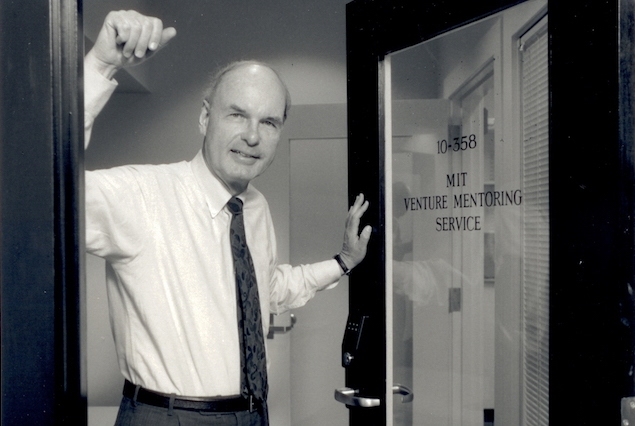Alexander L. M. Dingee Jr. ’52, co-founder of the MIT Venture Mentoring Service and a successful entrepreneur who started seven companies, died March 22, at his home in Rockport, Massachusetts, of complications from Parkinson’s Disease. He was 88.
The Venture Mentoring Service, with more than 175 volunteer mentors from the business world, offers entrepreneurship coaching, without charge, to MIT students, faculty, staff, and alumni. Since its founding in late 2000 as one of MIT’s first hands-on entrepreneurship programs, these mentors have worked with more than 2,800 ventures involving 3,600 individuals. These ventures collectively have raised more than $3.1 billion in funding, and more than 300 ventures have launched as viable businesses.
In 2013 Alec Dingee was awarded MIT's Lobdell Distinguished Service Award, which cited his "creative vision, exemplary dedication, and continuous involvement" as VMS co-founder.
Dingee, along with the late David H. Staelin ’60, SM ’61, ScD ’65, an MIT professor of electrical engineering and computer science, launched VMS to carry out a shared belief that young entrepreneurs would benefit greatly from advice given by others who understand the obstacles in building a business.
In an article in “MIT Spectrum” in 2001, Dingee cited how he started out in forming businesses, learning “the hard way” how to overcome the risks and roadblocks. “When I was young, I didn’t have anyone to advise me and I was in over my head. … I saw a real need for this kind of help.”
Dingee and Staelin arranged for the program’s initial funding and, introduced to each other by former MIT Provost Robert Brown, worked to place VMS’ operations under the Provost’s office as a way to ensure services would be available to all schools within the Institute.
At the outset, Dingee’s office was sometimes his car, and he and the initial handful of other mentors frequently met with their mentees in coffee shops. Dingee spent much of his time recruiting mentees, visiting Institute laboratories to tell students, faculty, and postdocs about the help VMS could give to commercialize their accomplishments.
Within a year, VMS had grown to have a permanent office and a staff. In 2002, Sherwin Greenblatt ’62 SM ’64, the just-retired president of Bose Corp. joined as volunteer director, which freed Dingee, now as the program’s chairman, to spend time perfecting the program and exploring new directions. This led to creation of a VMS Outreach program extension, which since has provided training in VMS’s methods to representatives from 92 universities, colleges, and economic development organizations in the United States, Canada, and abroad.
Dingee’s passion for perfection is seen as critical to VMS’s success. “He always insisted on doing things right,” Greenblatt says. “Over and above just mentoring, he zealously defended mentees against injustices or wrongs.” This included a strongly enforced code of ethics to block mentors from taking advantage of mentees.
Roberta McCarthy, the program’s operations manager until 2017, looks back on how carefully the VMS concept was structured from the outset “It’s amazing how he was able to put it all together,” she says. “The original premise is how it exists today.” Charles “Chip” Ziering ’72, SM ’75, a founder of Progress Software Corp. and the first mentor to join the founders, adds, “The resulting organization's thriving activities are a tribute to his determination and drive.”
Dingee’s career as a serial entrepreneur spanned five decades. His first business was a medical-device company he started during off-hours while in the Army. The peak came with Nexabit Networks, which developed the first terabyte-level internet router and was sold in 1999 to Lucent Technologies. He also led seminars and directed research on new venture development at MIT's Sloan School of Management and co-authored a book "New Venture Creation: A Guide to Entrepreneurship."
He is survived by his wife, Susan Jennifer Gray of Rockport; his daughters, Adrienne Tybjerg and her husband Niels Tybjerg of Arlington, Massachusetts, and Janette Dingee and her husband William Brickey of Chicago; his stepson, James Wagner and his wife Dee Dee Chen of Cambridge, Massachusetts; and his first wife, Grace Dingee of Arlington.
A Service to Celebrate Alec's Life will be held at the First Congregational Church of Rockport at 11 a.m. on Tuesday, April 9. In lieu of flowers, donations in Alec's memory may be made to the MIT Venture Mentoring Service.







